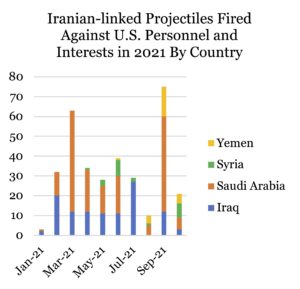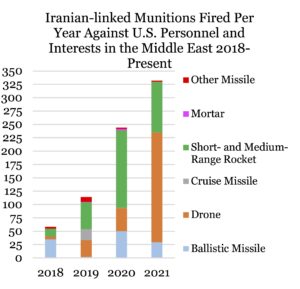Iran Summary – October 2021
About the Iran Update: The Jewish Institute for National Security of America’s (JINSA) Gemunder Center has started a monthly tracker providing timely information and graphics illustrating Iran’s aggressive and destabilizing activities.
October 2021 Summary: Despite agreeing to return to negotiations on the Joint Comprehensive Plan of Action (JCPOA) on November 29, Iran continued to impede International Atomic Energy Agency (IAEA) surveillance of its nuclear facilities and to target the United States and its partners in the Middle East, including in the cyber domain. The Biden administration has suggested it is exploring a “Plan B” should nuclear negotiations fail to yield results while considering, but not taking, actions against Iranian regional aggression.
Regional Aggression: While there were fewer total number of Iranian-backed attacks in October than September, Iran escalated its aggression by launching a drone strike on U.S. forces in Syria.
- On October 4, Israel accused Iran of orchestrating an attempted assassination plot against Israeli businesspeople in Cyprus.
- After rising tensions between Azerbaijan and Iran earlier in the month, including significant Iranian military drills along the Azeri border and allegations that Israel had deployed troops to Azerbaijan, the two states agreed on October 13 to deescalate tensions through dialogue.
- Hezbollah, Iran’s largest proxy, instigated a violent protest that resulted in six deaths on October 14 against the judge investigating the August 2020 Beirut port explosion.
- On October 20, coordinated drone and rocket strikes targeted the U.S. outpost at Tanf in southern Syria. U.S. officials believe that Iran resourced and encouraged the attack, possibly in response to Israeli attacks around Palmyra. To date, there has not been any public U.S. military response against the perpetrators or Iranian targets.
- Choosing to separate the nuclear talks from Iran’s regional aggression, President Biden told reporters during a press conference in Rome on October 31, “with regard to the issue of how we’re going to respond to actions taken by [Iran] against the interests of the United States — whether they’re drone strikes or anything else — is we’re going to respond, and we’re going to continue to respond.”
- Throughout October, Saudi Arabia intercepted several drones and ballistic missiles, including attacks against al-Abha Airport and King Abdullah airport, according to JINSA’s Iran projectile tracker.
- On October 29, The U.S. Treasury Department sanctioned entities critical to Iran’s drone program, including Saeed Aghajani, the commander of the IRGC Aerospace Force (IRGC ASF) UAV Command who oversaw the deadly attack on the MT Mercer Street in July.
- In addition to highlighting Iran’s proliferation of drones to Hezbollah, Hamas, Kata’ib Hezbollah, and the Houthis, the Treasury designation was the first U.S. government claim that Iran had sent unmanned systems to Ethiopia.


Nuclear: Biden administration officials publicly voiced their increasing frustration at Iran’s refusal to return for a seventh round of talks on reentering the JCPOA and warned of turning to a “Plan B,” without providing further details. At the end of October, Iran indicated it would resume discussions on November 29.
- On September 30, U.S. Secretary of State Antony Blinken said that “the ball remains in [Iran’s] court, but not for long.” He added, “there is a limited runway [returning to the JCPOA], and the runway is getting shorter.”
- On October 2, Iranian Foreign Minister Hossein Amir-Abdollahian asked the United States to unfreeze $10 billion in Iranian funds as a sign of good will before resuming negotiations. There are no public indications that the Biden administration has agreed to these terms.
- Blinken and Israeli Foreign Minister Yair Lapid said at a meeting in Washington that the two countries are discussing a “Plan B” should Iran refuse to continue diplomatic talks.
- While Blinken reiterated that there is still a diplomatic path with Iran, Lapid was more direct, claiming that “there are moments when nations must use force to protect the world from evil…. If a terror regime is going to acquire a nuclear weapon, we must act. We must make clear that the civilized world won’t allow it.”
- On October 19, the International Atomic Energy Agency Chief Rafael Grossi announced that the stop-gap measures agreed upon early this year for monitoring Iran’s nuclear facilities were no longer “intact.” He elaborated that Iran was blocking IAEA surveillance cameras at the Tesa Karaj facility, which produces essential components for centrifuges.
- On October 25, U.S. special envoy for Iran Robert Malley said that the Biden administration is “in a critical phase of the efforts to see whether we can revive the JCPOA,” and that Iran’s excuses for avoiding negotiations in Vienna are “wearing very thin.”
- Bagheri Kani, Iran’s political deputy at the Ministry of Foreign Affairs, tweeted on October 27 that Iran agreed to “start negotiations before the end of November.”
- The vague timetable provides Iran another month in which it can advance its nuclear program while ostensibly promising future discussions.
- Biden told reporters on October 28 that “we have heard positive signals that they are, but I think we have to wait and see when and whether they actually show up at the negotiating table.” Biden added that “We, of course, retain all other options to be able to deal with this program as necessary.”
- During an interview with 60 Minutes on October 31, Blinken finally appeared to put all options, including military means, on the table if Iran “is not prepared to engage quickly in good faith.”
Cybersecurity: Multiple cyberattacks during October underscored the vulnerabilities that American and Israeli companies face from Iranian hackers and Iran’s exposure to cyberattacks that could cripple its economy.
- On October 11, Microsoft announced that hackers allegedly linked to Iran targeted more than 250 customers “with a focus on U.S. and Israeli defense technology companies, Persian Gulf ports of entry, or global maritime transportation companies with business presence in the Middle East.” Microsoft speculated in a blog post that “gaining access to commercial satellite imagery and proprietary shipping plans and logs could help Iran compensate for its developing satellite program.”
- On October 11, Facebook announced that it had thwarted a “covert influence operation” within Iran conducted by individuals associated with the IRGC. The individuals ran a campaign posing as local news outlets to promote pro-IRGC content and content critical of opposition factions. Facebook reportedly removed 93 associated Facebook accounts and 194 associated Instagram accounts.
- Iranian official blamed the United States and Israel for a cyberattack on October 26 that disrupted the country’s fuel distribution but provided no evidence to support the claim.
- In the final days of October, the Iran-affiliated hacker group “Black Shadow” conducted successful ransomware attacks on Israeli businesses, including a web hosting company Cyberserve. The hacker group leaked data from companies that refused to pay, such as an LGBTQ dating app.
Human Rights: Human rights groups and the U.N have increasingly called out Iran for its serious and ongoing human rights violations.
- On October 13, Blinken commemorated the sixth anniversary of the wrongful detention of Siamak Namazi, one of at least four American citizens imprisoned in Iran.
- On October 20, the Center for Human Rights in Iran (CHRI) reported that Payam Derafshan, a lawyer known for taking on high-profile human rights cases in Iran, had been maimed while being tortured by the IRGC in Tehran’s Evin Prison after criticizing the regime.
- Javaid Rehman, Special Rapporteur on the situation of human rights in the Islamic Republic of Iran for the U.N. Human Rights Council, claimed that Iran executed at least 230 individuals in 2021 and over 250 individuals in 2020, among them at least four minors.
October 6: “Fifth Fleet’s Task Force 59 Is a Good Start,” John W. Miller and Ari Cicurel, Real Clear Defense
October 14: Erasing the Leverage Deficit: How to Keep Tehran from the Bomb, JINSA’s Iran Policy Project
October 15: “Israel Needs Weapons to Stop Iran’s Bomb,” John Hannah, Foreign Policy
October 15: “Sectarian Violence in Beirut,” Ari Cicurel, Andrew Ghalili, and Sam Millner, JINSA National Security Brief
October 22: “Drone Strike Against U.S. Forces in Tanf, Syria,” Ari Cicurel and Blaise Misztal, JINSA National Security Brief
October 29: “Don’t Believe Iran’s Claims of Another Nuclear Milestone,” Blaise Misztal and Jonathan Ruhe, The National Interest